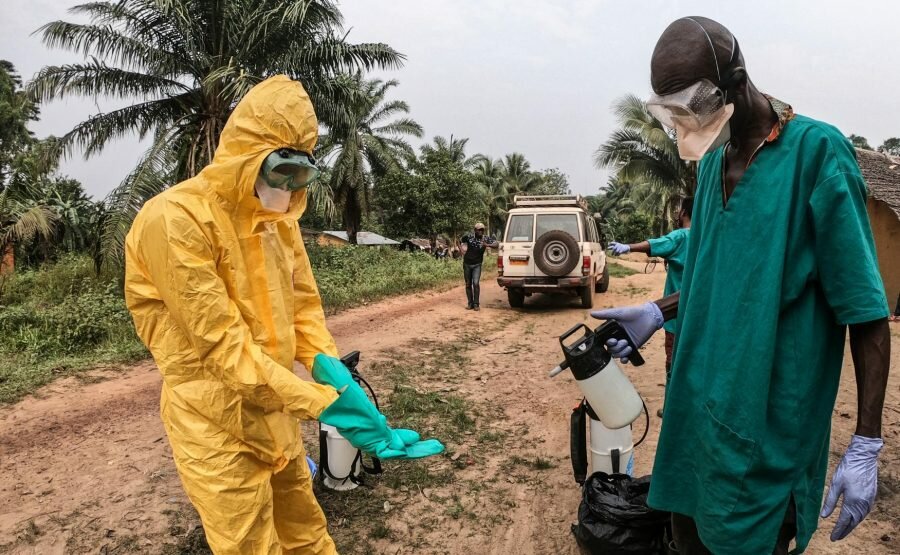The World Health Organization joins its offensive against Ebola in Uganda

Nine provinces in the country have been affected by this new outbreak of hemorrhagic fever, with 77 deaths so far
Hector Alonso
While waiting for the first vaccines to arrive, Uganda, with the support of experts from the World Health Organization (WHO), is stepping up its efforts to control an Ebola outbreak that has already affected nine districts in the country, of which there are three populated cities. As of 14 November, there have been 141 confirmed and 22 probable cases (163 total), 55 confirmed cases and 22 probable deaths (77 total deaths) reported. 19 toilets were infected with the virus and seven died.
A panel of WHO experts evaluated the three existing vaccines and decided they would all be used in a clinical trial, since this outbreak corresponds to one of six species of the Ebolavirus genus, the Sudan variant, for which there is no vaccine. It is approved, unlike what happens with the variety that appeared in other countries (Zaire Ebola virus).
The goal of the randomized trial is to evaluate vaccine candidates that are potentially effective and possibly help end ongoing outbreaks and protect vulnerable populations in the future. The trial is the result of a collaborative effort coordinated by WHO with developers, academic institutions, vaccine dose sponsor countries, regulatory authorities, other experts and the government of Uganda.
vaccinations in a week
Supplies of one of the three vaccine candidates are expected to arrive in Uganda next week and the other two shortly thereafter. The testing protocol has been conditionally approved by the World Health Organization and Uganda with final approvals expected soon. The national regulatory body is expected to issue import permits for vaccines soon. While the start date for the trial is not yet certain, WHO is working with the Department of Health and Makerere University, which is leading the trial, to ensure that everything is ready and that the trial can begin as soon as it is completed. The vaccine has arrived and all experimental preparations are ready. Place.. The other two candidates will be added when available.
“The start of vaccine trials will mark a pivotal moment towards developing an effective tool against the virus behind the current Ebola outbreak in Uganda,” said Dr Matshidiso Moeti, WHO Regional Director for Africa. “In previous outbreaks, we have seen how effective vaccines have prevented further spread of the virus, helping to quickly contain the epidemic. But it will take time to get trial results, and at the moment outbreaks can be controlled without vaccines, as we are already seeing as transmission slows. Infection in many affected areas.
Uganda declared the outbreak on 20 September. As of November 14, 2022, there have been 163 confirmed cases and 77 deaths reported. Among the dead were seven health workers. The affected areas include the capital, Kampala, and the cities of Jinja (300,000 people) and Masaka.
In support of the outbreak response, WHO has deployed 80 experts and supported health authorities with the deployment of an additional 150 experts, including more than 60 epidemiologists. Given the infectious nature of Ebola PPE in Sudan, including gowns, gloves, eye protection and medical masks, it is critical to provide safe patient care.
The World Health Organization recently delivered 15,000 personal protective equipment to Uganda, enough to protect health workers caring for patients entering existing Ebola treatment units for 30 days. WHO has helped train nearly 1,000 health workers and village health team members in contact tracing, and another 1,155 health workers in infection prevention and control in health facilities. The planned budget is $88.2 million, but so far the WHO has received only 20 percent of that amount.
Fifth outbreak
The current Ebola virus outbreak in Sudan is the fifth of its kind in Uganda. Seven cases and four deaths were recorded in Sudan’s previous Ebola virus outbreak in the country in 2012.

“Coffee fanatic. Gamer. Award-winning zombie lover. Student. Hardcore internet advocate. Twitter guru. Subtly charming bacon nerd. Thinker.”











